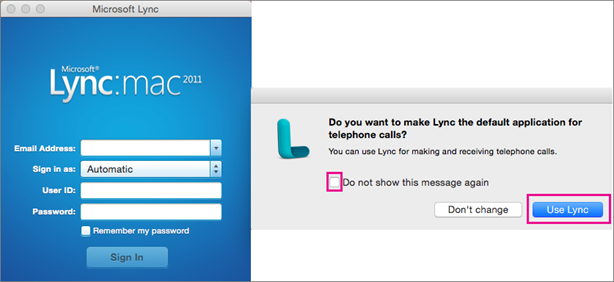
Represents a collection of utility functions.Įnumerates the client access levels in use.Įnumerates the SignIn states of the Lync client.Įnumerates the contact information types. Represents data for the UriChanged event.
#Microsoft lync code
Used to get the estimated start delay in milliseconds, and the status code for the delay from the event SignInDelayed in the LyncClient class.Įxception thrown when the item type specified conflicts with existing item type. This class object can be obtained by the property Configuration from the LyncClient object. Self is used to publish your information for other people to see.Ĭonfiguration Class which handles the endpoint configuration, such as TransportMode, Internal Server and External Server addresses, sign in auto retry etc. Represents a single result of a search that returns one or more results. Represents data for the SearchProviderStateChanged event. Represents the event data of a ResiliencyModeChangedEvent.Įxception thrown when there are too many results to be returnedĮxception thrown when a search operation ended with an error. Used to get the endpoint capability types from the event CapabilitiesChanged in the LyncClient class.Įncapsulates a communication capability as published by a contact.Įncapsulates information about the delegate representation.Įxception thrown when the request is already cancelled. Represents the event data of a PhonesChangedEvent. Represents a publishable telephone number used to reach a contact. Represents the Lync client and provides access to conversations and contacts via their respective manager classes.Įxception thrown when the Lync client is not initialized or is already shutdown.Įxception thrown when the operation is pending or Lync client is not ready for the operation.Įxception thrown if Lync client is not signed in when a sign in-dependent operation is started.Įxception thrown when user did not start Lync client.Įxception thrown when Lync client failed on an operation.Įxception thrown when a new operation cannot be started because a previous operation is not finished. Implements the client class which represents the main entry point for the API. Raised when the Exchange ECP Url changes.Įxception thrown when the Lync API class object is not in a valid state to start an operation.Įxception thrown when the item aleady existsĮxception thrown when an item is not found in a collection.Įxception thrown when joining a room is failedĮxception thrown when joining a room is unauthorizedĬlass representing a localized string with locale ID. Represents the new state of a delegator client collection.Įncapsulates the new state of the Exchange ECP Url. Represents a Client instance delegated to act on behalf of a delegator. Represents a user-defined availability state that is honored by Lync. The password, domain and user names can be changed from the event data object obtained from the event OnCredentialRequested.

Specifies the type of contact information to be to be subscribed on a collection of contacts set in the subscription.Įxception thrown when an unauthorized content type is added to the content collection of the ContentSharingModality.Įxception thrown when a cotent title already existsĮxception thrown when a content title already exists.Įxception thrown when a content title includes invalid characters.ĬredentialRequestedEventData Class which is used to get the credential request type, domain and user names.

Represents the contact settings that were changed as a result of a contact setting changed event. The contact manager is also used to access Lync contact list groups.
#Microsoft lync update
The contact manager class is used to add, remove, and update contacts and their properties. Represents information that has changed for a given contact. Represents a collection of endpoint identifiers available to a signed in user. Represents a collaboration endpoint which may be a SIP endpoint or a TEL endpoint. A contact can be person, bot or phone number. Represents a contact within the Lync client. The client setting state that has changed.ĬlientStateChangedEventData Class which is used to get the old, new client states and the status code from the StateChanged event in the LyncClient class.Įxception thrown when Lync is not configured properly. Represents the Lync client and provides access to conversations and contacts via their respective manager classes.Įxception thrown when client process cannot be found

Represents the event data of an AccessEntr圜ollectionEvent.Įncapsulates the new state of an AlertLevel instance.Įxception thrown when the object is already initializedĪbstract client class which represents the main entry point for the API.

Represents a user, workgroup, enterprise, federation, or public entity and the associated privacy level. Microsoft makes no warranties, express or implied, with respect to the information provided here. Some information relates to prerelease product that may be substantially modified before it’s released.


 0 kommentar(er)
0 kommentar(er)
